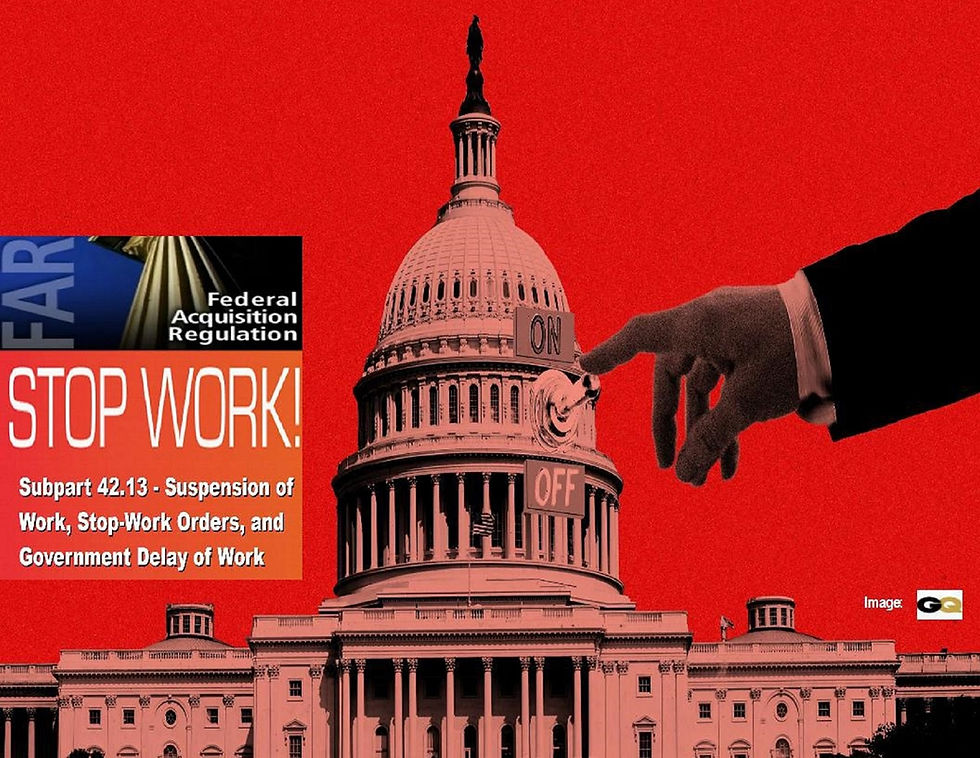The Risk Of A Federal Government Shutdown Is Real – Prepare Now
- Ken Larson

- Apr 11, 2023
- 3 min read

For Detailed Guidance on Rights and Obligations Upon Receipt of a Federal Government Contract Stop Work Order See:
“WASHINGTON TECHNOLOGY” By Nick Wakeman Editor In Chief


“Dysfunction on Capitol Hill increases the odds of protracted appropriations battles and agencies going unfunded. The contracting industry needs to be prepared for a shutdown and the time to prepare is now.”
_________________________________________________________________________________
“With April 1 comes the start of the second half of the government fiscal year. Traditionally, this is a time to put the finishing touches on plans and strategies to hit your numbers in the last two quarters.
But things feel different this year.
We are used to starting fiscal years with a continuing resolution. What often follows are multiple CRs before a final budget is passed, usually during the fiscal first quarter.
But after watching House Republicans take 15 votes before picking a speaker, you have to question their ability to reach a consensus and much less negotiate a budget with the Democrats.
The contracting industry needs to be prepared for a shutdown and the time to prepare is now.
I had the opportunity recently to talk to Rich Wilkinson, senior industry director for GovCon at Unanet, and Kim Koster, vice president of industry marketing at Unanet, about the risks companies face and how they should prepare.
They recommend that companies run through every active project and ask certain questions, such as:
Is the contract funded?
Is work performed at a government site?
Will you have access during a shutdown?
Will government personnel be available?
Can work continue without access?
Will you have access to tools and records?
If the work is funded and you don’t get a stop work order, then you have no choice but to keep working.
“You can’t quit work; they won’t let you unless they lock you out,” Wilkinson said. “You are under contract and you have to work.”
The bigger issue will be with cash flow because with a shutdown there is a risk that the offices that pay the bills will be shut down.
“You better have a friendly banker to fund your payroll for a few weeks and hopefully no longer than that,” he said.
A strong relationship with your bankers is critical, especially for small businesses that often rely on a line of credit to meet their payroll and other expenses, Koster said.
The good news there is that the government has gotten better at paying its bills quickly, often in less than 30 days, so bankers know that the cash will be there eventually so contractors are starting this conversation from a position of strength, she said.
“I’d be talking to my banker about maybe extending the line of credit and bumping up the limit,” Wilkinson said.
But more critical than the bank are the contracting officers, especially if you have employees who work at a government facility that might be shut down.
“You want to ask: If I get locked out, are you going to give me a stop work order? The right answer is yes,” Wilkinson said.
A stop work order gives contractors certain rights. For example, contractors can be paid for shutdown and restart costs.
If the contracting office happens to say no to a stop work order, you need to bump it up the chain of command until you get the right answer, Wilkinson said.
But you need to talk to the contracting officer before a shutdown because the day after a shutdown, “their phone will be ringing off the hook,” he said.
There is a risk that the contracting officer will also be sent home, he said.
“That’s why you need to make a plan for each of those contracts,” Koster said.
You also need to be able to segregate your costs of the shutdown so you can get reimbursed later. “It is very important that you have a system in place that allows you to do that,” she said.
If a shutdown lasts beyond a week or two, many companies will be looking at furloughing employees. If there is no work that they can do at the office or from home, companies have little choice.
“You have to have a plan before it happens and it is really, really important to communicate that plan to the employees,” Wilkinson said. “People can deal with bad news so much better than they can with uncertainty.”
RELATED TOPIC: Limitation of Funds and Funding Exposure: https://www.smalltofeds.com/2007/09/limitatoin-of-funds-and-funding.html




Comments